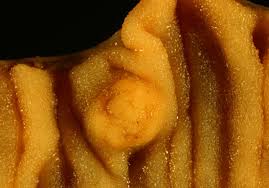 The human body consists of complex networks of various systems. Among which, the system made up of glands and organs that produces hormones, plays a vital role in coordinating the body’s metabolism, reproduction, growth and development, and response to injury, stress, and mood. When the cells of these organs begin growing abnormally and turn malignant or cancerous, it results in carcinoid tumours.
The human body consists of complex networks of various systems. Among which, the system made up of glands and organs that produces hormones, plays a vital role in coordinating the body’s metabolism, reproduction, growth and development, and response to injury, stress, and mood. When the cells of these organs begin growing abnormally and turn malignant or cancerous, it results in carcinoid tumours.
A carcinoid tumour is an extremely rare type of cancer that begins in the neuroendocrine cells found throughout the body, but mainly in the gastrointestinal system. The primary function of these cells is to produce hormones and regulate the release of the digestive juices. When these cells turn cancerous, they trigger the production of the extra amounts of certain hormones and chemicals in the system, it leads to severe and various health complications.
Carcinoid tumours can occur in any part of the body but are most often found in the lower section of the small intestine. Other body parts that can get affected by carcinoid tumours are the lungs, kidneys, appendix, ovaries, rectum, stomach, and ovaries.
Causes of Carcinoid Tumour
The cells that are present in the endocrine system have traits like those of nerve cells and hormone-producing cells. However, there can be traces of specific links to certain inherited conditions that might act as trigger. These conditions are often hereditary in nature, resulting causing tumours of the hormone producing glands.
There are some hereditary conditions that causes tumours or cysts to grow in certain parts of the body, including the brain, spinal cord, eyes, inner ear, adrenal glands, pancreas, kidney, and the reproductive tract. There are also other forms of conditions, that is characterised by – the growth of tumours along the nerves in the skin, brain, and other parts of the body.
Symptoms of Carcinoid Tumour
The signs and symptoms of the carcinoid tumour varies from person to person and often depend upon the location of the tumour, grading the tumour, and hormone secretion.
For instance, the growth of carcinoid tumour in the lungs can cause shortness of breath, chest pain, wheezing, diarrhoea, hot flushes, and sudden weight gain. Patients with a carcinoid tumour in the digestive tract complain of severe abdominal pain, nausea, vomiting, pain in the rectum, and rectal bleeding.
Among the the other common symptoms are:
● Severe fatigue
● Anaemia
● Jaundice
● Low blood pressure
● Irregular heartbeat
Carcinoid Tumour can cause other health complications.
Though the carcinoid tumours are slow growing, they may get metastasized and spread to other parts of the body, and often lead to various other conditions, including:
● Cushing Syndrome, in case of too much cortisol or stress hormone
● Ulcers and Zollinger-Ellison syndrome if the tumour produces excess gastrin — a stomach acid.
Carcinoid syndrome occurs if the tumour releases too much serotonin causing frequent diarrhoea, oedema, jaundice, and faster heart rate.
Diagnosis
A carcinoid tumour is diagnosed by running a few blood and imaging tests. The blood and urine tests would reveal the presence of specific hormones and other chemicals in higher amounts.
The doctor would also recommend various imaging tests, including CT-Scan, Magnetic Resonance Imaging (MRI), PET-CT scan. DOTA Scan can also help in diagnosis and therapy for carcinoid tumours. Other tests might include endoscopy and biopsy (collection of tissue samples from the affected organ) for better correlation of results.
Treatment
Surgery aids in removing the cancerous cells entirely from the system. If cancer has progressed, the surgery can only provide symptomatic relief, but the patient might require an aggressive treatment plan to curtail its further growth.
Doctors recommend somatostatin analogue medicines, which is the man-made version of somatostatin, an important hormone that regulates the activity of the gastrointestinal tract and prevents the rapid reproduction of cells. These hormones help in controlling the release of hormones, followed by chemotherapy, radiation, targeted drug therapy, etc.
The patient may require multiple cycles of chemotherapy and radiation to combat carcinoid tumours.
Patients would require regular health check-ups, practice mindful eating, and healthy lifestyle changes to stay fit and lead a better quality of life post-treatment.
Dr. Jagannath Dixit, Surgical Oncologist, HCG Cancer Centre, Bengaluru
 Newspatrolling.com News cum Content Syndication Portal Online
Newspatrolling.com News cum Content Syndication Portal Online






